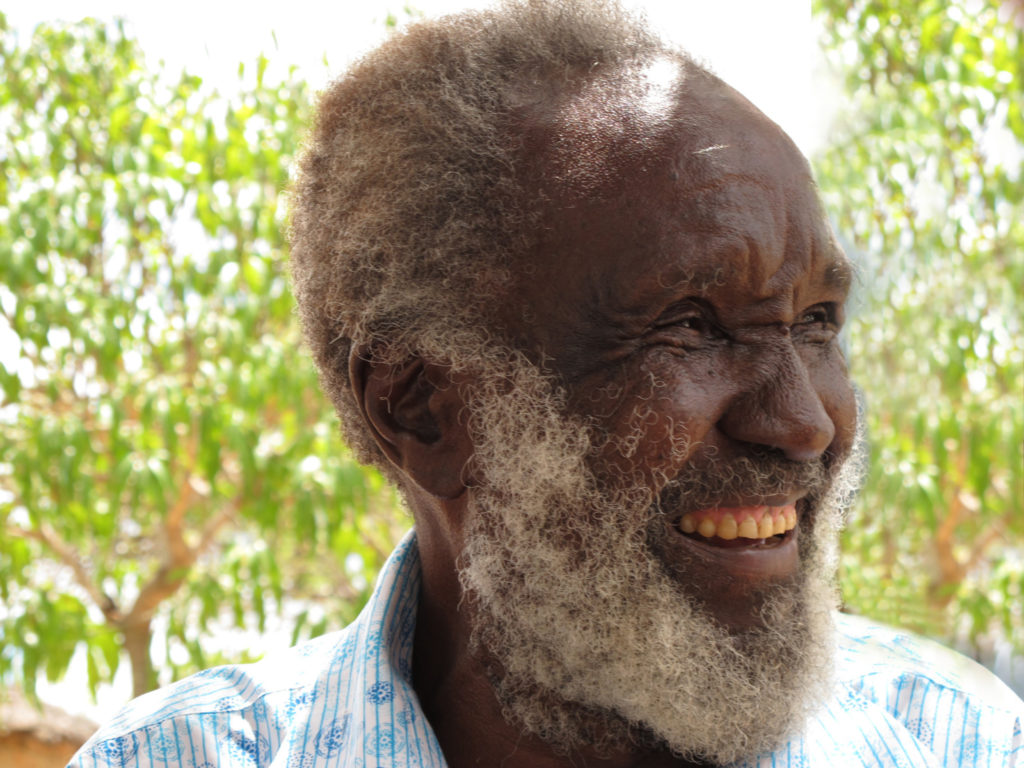The Passing of Mentor and Master Water Harvester Mr. Phiri
In September 2015, I got word from Ken Wilson of the Muonde Trust that an incredible mentor of his, mine, and of thousands around the world, Mr. Zephaniah Phiri Maseko, had passed away.
Mr. Phiri had set me on my path in 1995 (and his story and teachings became the core of my first book, Rainwater Harvesting for Drylands and Beyond, Volume 1, 3rd Edition) when I spent one day with him on his farm in the driest region of Zimbabwe. Over the course of 30 years, he and his family had turned a wasteland into an oasis by planting the rain. I was inspired to the core.
And when I told him how concerned I was with the water situation in my community and watershed, and how I was thinking of leaving my community because of this, he presented me with this challenge:
“You cannot leave. You must set your roots deeper than you ever thought possible. Because if you run from your problems, you will just plant problems everywhere you go.
“You must instead try to find solutions. If you succeed, you will then have the ability to find solutions anywhere.”
I returned home determined to do just that, guided by the example of Mr. Phiri and his family.
In 2014, nineteen years after spending that day with Mr. Phiri, I had the opportunity to return to Zimbabwe to his farm. I was excited, but also fearful. I wondered if what he had done was really as wonderful as I remembered. I wondered if my vision had been clouded by his incredible storytelling.
The oasis that greeted me shattered my fears, renewed my memories, and furthered my learning. Mr. Phiri and his family had continued to evolve their practices and, with them, the farm. By working in partnership with natural patterns of living systems, more wonders had flourished. Water was everywhere seeping out of the earth. All was incredibly verdant. In some areas of the farm the song of nesting birds was so thick you had to raise your voice to be heard. It reeked of rotting fruit along the swales where the mango trees were so productive that family and visitors could not keep up with the harvest. And in an area where big wild animals are seldom seen due to all the human activity, many of these animals could be seen walking the perimeter of Mr. Phiri’s farm. Zebra were the latest visitors before my last visit.
And while Mr. Phiri had slowed physically with age, he was as whip-smart and joyful as ever. Teaching, challenging, sharing, and storyweaving constantly.
But more impressive still was what others had done—inspired and taught by Mr. Phiri. Ken and others from the Muonde Trust showed me amazing projects and introduced me to the local innovators who were responsible for them. These, like the Phiri farm, were lushscapes where those living on the land were actively planting the rain, observing natural patterns, and working with them. Some of them, like myself, had also spent only one day with Mr. Phiri, but the inspiration spawned by that meeting carried on for the rest of their lives.
Additionally, I got the opportunity to spend time with a number of women who had recently been apprenticing with Mr. Phiri, and to whose apprenticeship program I had donated funds through the Muonde Trust, www.Muonde.org. These women had become leaders in their communities by walking their talk, planting the rain, and seeking and practicing solutions informed by observing the natural systems in which they lived. These women are the best teachers I’ve ever witnessed. They teach by their example, their song and dance, and the principles they hold strong and share. In 10 years or less I am confident they will easily surpass what Mr. Phiri accomplished in 30 years, thanks to his guidance, their drive, and the community of practitioners that is building.
I missed Mr. Phiri the moment I left his farm. But his laugh, caring, his endless fight to live and be what he feels is right, his stories, and what he inspires—these infiltrate you. They germinate within. They grow. And they spread.
Thank you, Mr. Phiri, for all you have given me, your family and community, the watersheds, and the world.
You can read still more on Mr. Phiri in my next blog entry—Evolutions on Mr. Phiri’s Water-Harvesting Plantation, 1995–2016—and in his Book of Life presented to him in 2010.
Within his Book of Life, I wrote the following tribute to him.
You can also visit Muonde.org to learn of many others he inspired who are now carrying on similar work in Zimbabwe.

